#adventures in sakartvelo
Text
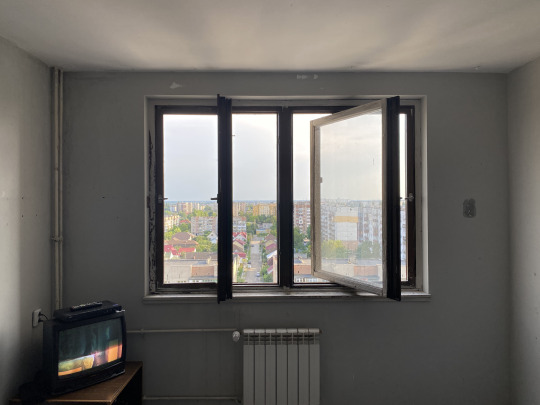
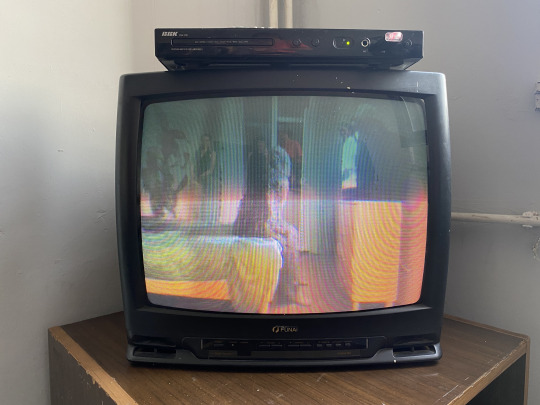
Аліна Якубенко - Пріключеніє русского солдата
Резиденція Вибачте Номерів Немає
10 липня, 2023 року,
Double room 1114, готель Інтурист-Закарпаття
У своїх малюнках та працях київська художниця Аліна Якубенко критично та іронічно розглядає агресивні та жорстокі дії “мирних” росіян зі зброєю в руках, в Україні. Котрі в Другій серії після російсько - чеченських та російсько-сакартвело воєн продовжили вбивати та гвалтувати в Україні під виглядом пригод випадково потрапившого русского солдата в Україну.
Резиденція та виставка Аліни Якубенко стали можливими завдяки підтримці:
European Cultural Foundation - Ukraine edition of the Culture of Solidarity Fund
The beaux-arts Academy in Paris
(eng)
Alina Yakubenko - The Adventure of a russian soldier
Residence Sorry No Rooms Available
July 10, 2023,
Double room 1114, Hotel Intourist-Zakarpattia
In the drawings and works, the Kyiv female artist Alina Yakubenko critically and ironically examines the aggressive and brutal actions of “peaceful” russians with weapons in their hands in Ukraine. Who in the Second Series, after the russian-Chechen and russian-Sakartvelo wars, continued to kill and rape in Ukraine under the guise of the adventures of a russian soldier who accidentally got into Ukraine.
Alina Yakubenko’s residency and exhibition became possible thanks to the support of:
European Cultural Foundation - Ukraine edition of the Culture of Solidarity Fund
The beaux-arts Academy in Paris
Photo credit Petro Ryaska
0 notes
Text
This is the last post in a series! You can start from the beginning in Kutaisi here, or browse the whole Adventure in reverse order using the tag here. And as ever, click the images for full-size versions.
The 12th century Tsunda church: locked to visitors, with an alcove by its hearth stained by the soot of centuries of votive candles. I wonder how many have burned there?
Breakfast was a truly scrumptious mix of local fruits, veg and preserves, cheeses, fresh bread, and good black tea (with milk, even!) Unfortunately Arpi was totally ruined with sickness and couldn’t eat, so half – well, a third – of it went back uneaten. I scrubbed the transport arrangements to Batumi, cancelled the nice-looking airbnb in Batumi, agreed another night with our lovely hosts, and asked them if the offer to drive me around the ancient monastery and fortress complexes was still open. It was. So myself, the guesthouse owner and the 12-year-old daughter went off on a ROAD TRIP.
Southeast of Akhaltsikhe, on the way to the Turkish border, the Kura has eaten deep into the stone of the Caucasus mountains.* There are flat valley floors here, rectangles of green and yellow like elongated chequerboards, but it’s mostly a rugged landscape of high hills and scree. Huge building works were going on near the road, vast concrete pilings and silver pipes reaching down from mountaintops; we discussed what was going on, eventually reached a shared understanding of pumped storage. Bright sun beat down; the constant hiss of the crickets mixed with the rush of the airstream, changing in tone as we jinked around crags and big holes in the road. There were more cows about than cars, and it was difficult to get a sense of how busy this place must have been in its heyday. But the relics of a past Georgia were everywhere: a beacon-tower from the time of Tamar; a church one thousand years old; a fort that had once been sacked by Alexander.
“There was a market here for selling people. Is that right?”
“Slaves?”
“Yes. A slave market.”
Past the confluence with the Paravani river, the land takes on a different character. Like Dartmoor, evidence of sustained, intense human activity is just beneath the surface everywhere: step-farm wine terraces abandoned for centuries; cliffs riddled with mysterious, too-regular holes; remote domes perched on crags; the high, remote, romantic silhouette of the earthquake-slighted Tmogvi fortress, its ruined towers merging into the mountainside. Eventually, most dramatically of all, we came to the monastic cave-city of Vardzia.
https://brosencrantz.files.wordpress.com/2018/07/20180701_102951.mp4
Dramatic Vardzia Reveal. But if that doesn’t work for you, there’s a photo here.
From a distance, Vardzia looks like a termite mound with the side kicked off, if termites could carve out entire mountains. A quake in 1283 did terrible damage, and the whole site was abandoned after an Ottoman invasion a few centuries later. Around three hundred chambers survive of a supposed six thousand. The guidebook at the guesthouse said that it only has four levels now, from an original eight; the audioguide I rented (in good, slightly breathless English) contended that the original number had been nineteen. Much of the city’s structure can only be guessed at, but if you start from the idea of a well defended fortress-monastery dug into the hillside, with a supporting town in its skirts, the picture comes together.
I hiked up the hillside to the base of the complex, rather than wait for a minibus; there were a handful of other tourists there, some American, some Russian. The exposed architecture is weathered to abstraction, and I needed the guide to explain most of the chambers. There were buried stables, refectory chambers similar to those at David Gareja, rooms with huge ceramic wine vessels buried in the floor. A belfry with martens nesting in its carved eaves is one of the rare parts of Vardzia which was actually meant to be above ground. Deep within the mountain, accessed only by a hundred yards of bent-double crouch-walking, a clear spring next to a floodlit chapel gave a real, rare sense of serenity. The audioguide was filled with explanations of sneaky ways the locals would wall themselves off in times of trouble (with only one main entrance and exit to the city). And wonderfully, the core holy site and the most artistically important part of the whole complex has survived very well: the Church of the Dormition, with its ancient but decently-preserved paintings of angels, saints and Tamar the Great.
Tamar occupies a similar position in the Georgian national pantheon as Elizabeth I does in the English: a much-celebrated queen** ruling over a golden age of cultural achievement (with her chronicler Shota Rustaveli an independently-legendary writer of Shakespearean renown***), their reputations shining all the more brightly owing to reigns bookended by periods of darkness and horror. Her depiction at Vardzia is the oldest and most famous, dateable very precisely to within a year of 1185. In a fantastically detailed royal costume, she’s moon-faced and tough-looking: narrow eyes, strong brows and a pursed mouth might indicate character, might depict courtly formality, might be the 1180s ideal female beauty, or might just be the result of an artist used to painting human faces in a martyrdom context. A long, winding, dusty stair took me back to the valley floor; my Georgian guides, who had seen it all before, were chilling by the river. We refilled our water bottles at a fountain, and rode on.
The Vanis Kvabebi complex (“Vani’s caves”) is if anything even more interesting than Vardzia, because it’s easier to understand how it worked in its golden age. A triangular settlement, two sides defined by a deep V-shaped notch in the canyon, one a massive fortification still impressive eight hundred years later. The open-air buildings are mostly now outlines and wildflowers, but the cave dwellings remain in decent nick. A segment of the dome of a fallen church is visible above an altar; in the caves, ancient wine-vessels cut ceramic-lined circles in the floor. Above it all, a tiny dome perches like an eagle’s nest (see if you can find it in the pictures), supposedly lined with ancient calligraphy. My guide was eager to show it off, and borrowed a key from a bearded monk who seemed to appear from nowhere, but a long, steep, rickety pathway and a makeshift ladder later we were wiggling it without effect in a lock. Maybe the lock needed oiling; maybe the monk didn’t like our faces.
Last point on the journey back was Khertvisi Fortress, which stands where the fairly dramatic Paravani River meets the extremely dramatic Kura. Legend says Alexander stormed a predecessor of this castle – plausible, it’s a supremely defensible point even by the very high local standards. As with most of these places, imagination is required regarding the contents, but the keep, the towers and the gingerbread-man-hand crenellations all stand on their own, huge and impressive.
We came back into Akhaltsikhe via a moneychanger – an interesting thing I’ve learned on travels into similar economies is that you get better exchange rates in the back of beyond than you do in the big cities – and I tried, with only partial success, to pay my hosts properly for the wonderful journey. I can’t remember what trifling amount they eventually accepted, but it wasn’t enough. I roused a still-ill Arpi, wrapped up our belongings, and we headed for Kutaisi and the long journey home.
* One plausible etymology for the river’s Georgian name is “gnaw”, as in “gnaws through mountains”.
** There are lots of modern English-language references to Tamar as “King” rather than “Queen”, and half-baked suggestions that this is a unique honour or that she somehow had a masculine kingliness. But Georgian doesn’t have grammatical gender, so her title is genderless – “monarch” or “sovereign” would be more appropriate.
*** If you really want to stretch the point, The Faerie Queen and The Knight in the Panther’s Skin are also roughly equivalent, being famous era-defining literary works which are also thinly veiled political allegories about the queen. But that’s a bit tortuous.
Georgia 2018
Good morning, Kutaisi! – Museums and wine – Chiatura from above – Pioneers’ Palace, Gori – Tbilisi – David Gareja – Akhaltsikhe – Vardzia
the hall of the mountain queen This is the last post in a series! You can start from the beginning in Kutaisi…
1 note
·
View note
Photo
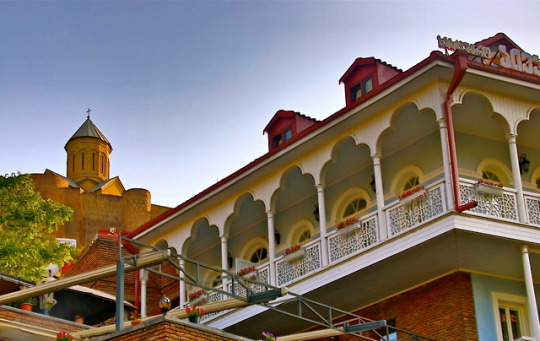
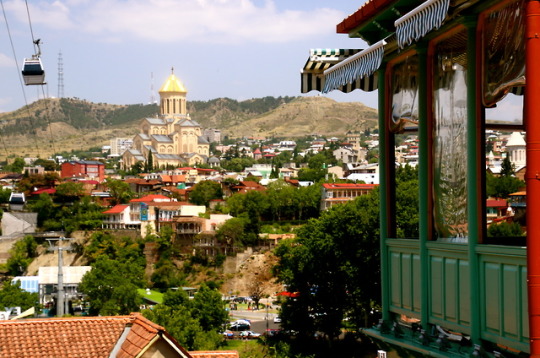
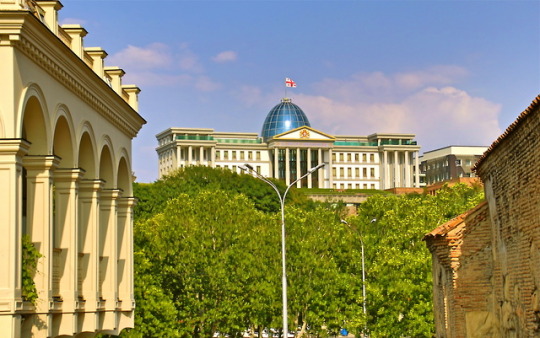
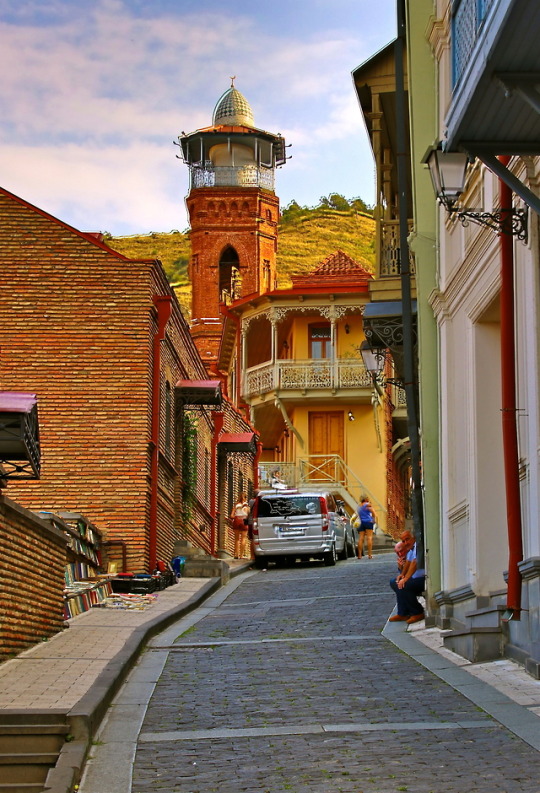
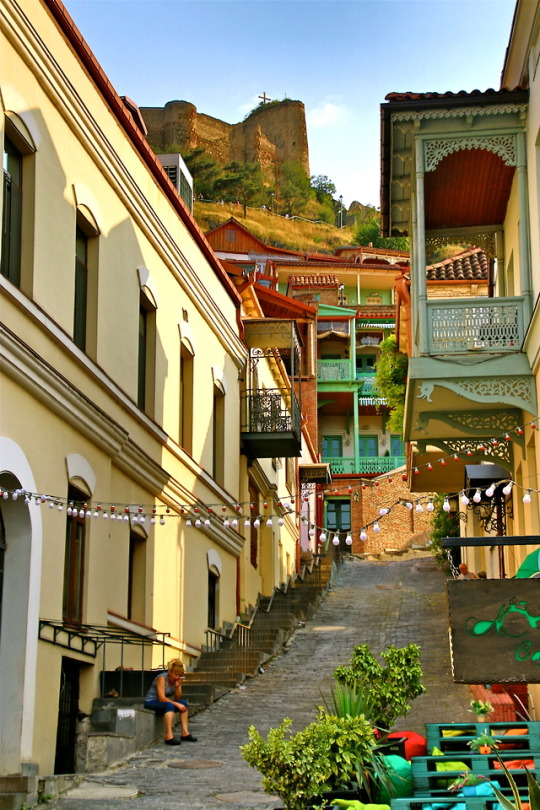
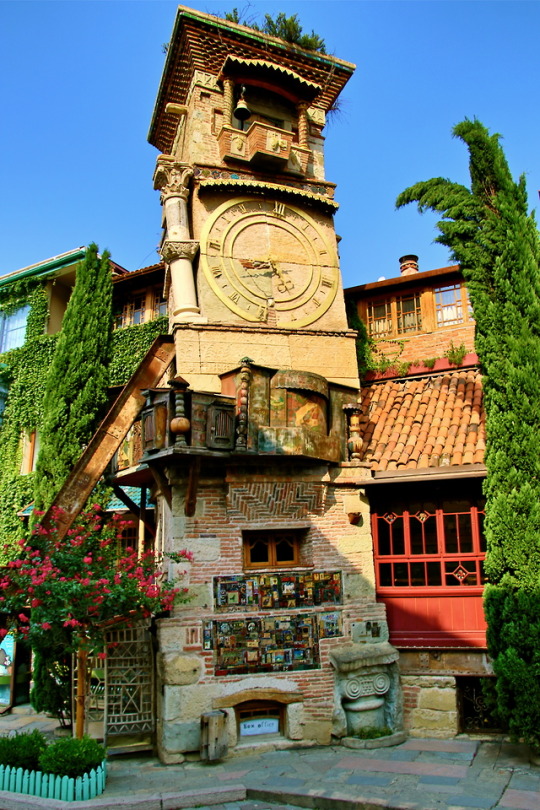
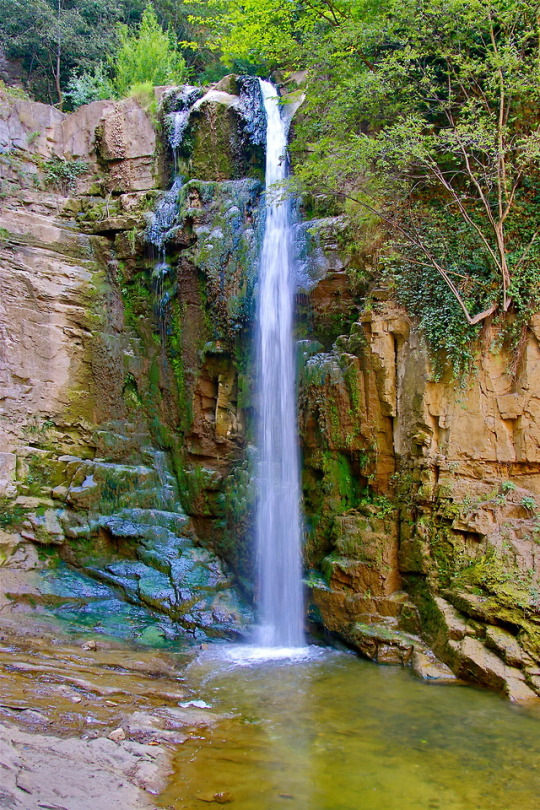
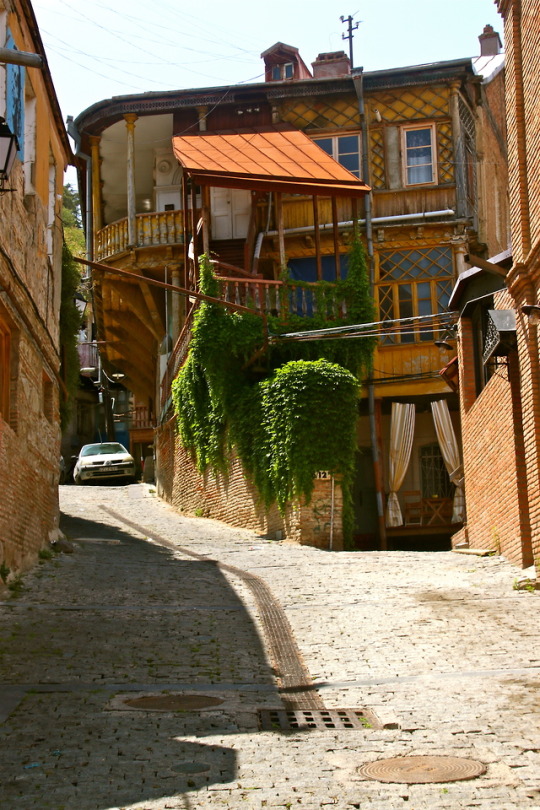
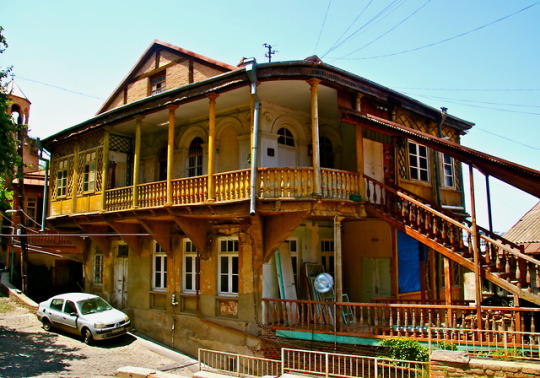
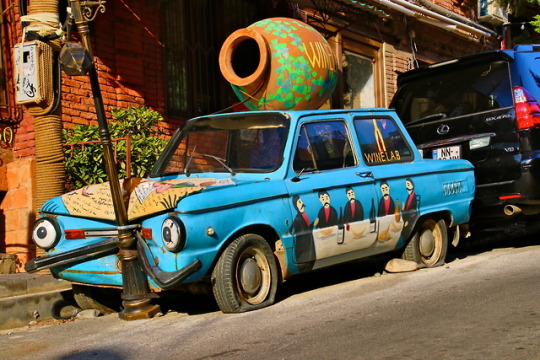
Tbilisi ( Georgia )
#tbilisi#oldtbilisi#tbilisicity#tbilisigeorgia#tbilisiphoto#traveltogeorgia#georgia#visitgeorgia#georgiatravel#travelphotography#travelphotooftheday#adventure#travel#traveldestination#capitalcity#sakartvelo#gruzja#world#trip#travelanddestinations#travel around the world#around the world#walk#citywalking#georgianwine#photography#cityphotography#beautiful#travelgram#travel photo blog
14 notes
·
View notes
Photo
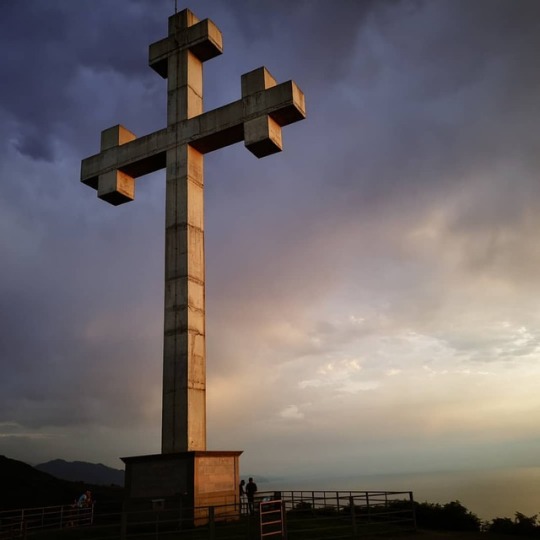
In the West we take many things for granted, but in the East something like a giant cross next to a major city in #Georgia Batumi is an absolute enigma once you try to find any information. I share my experience of hiking to this mysterious object. #travel #photography #blog #hiking Read more here: https://ctdots.eu/places/sakartvelo/hiking-batumi-hill-cross/ #connectingthedots #photooftheday #picoftheday #photographyislife #photography #awesomeearth #travelwriter #travelblogging #travelblog #travelblogger #postcardsfromtheworld #adventure #instagood #instadaily #mountainslovers #travelphoto #traveler #welivetoexplore #travel #ontheblog #instagoodmyphoto #travelandlife #worldplaces #igshotz #huntgram (at Batumi) https://www.instagram.com/connect.ngthedots/p/BxYDcibg1d_/?utm_source=ig_tumblr_share&igshid=1qpiiozrw1mix
#georgia#travel#photography#blog#hiking#connectingthedots#photooftheday#picoftheday#photographyislife#awesomeearth#travelwriter#travelblogging#travelblog#travelblogger#postcardsfromtheworld#adventure#instagood#instadaily#mountainslovers#travelphoto#traveler#welivetoexplore#ontheblog#instagoodmyphoto#travelandlife#worldplaces#igshotz#huntgram
1 note
·
View note
Photo
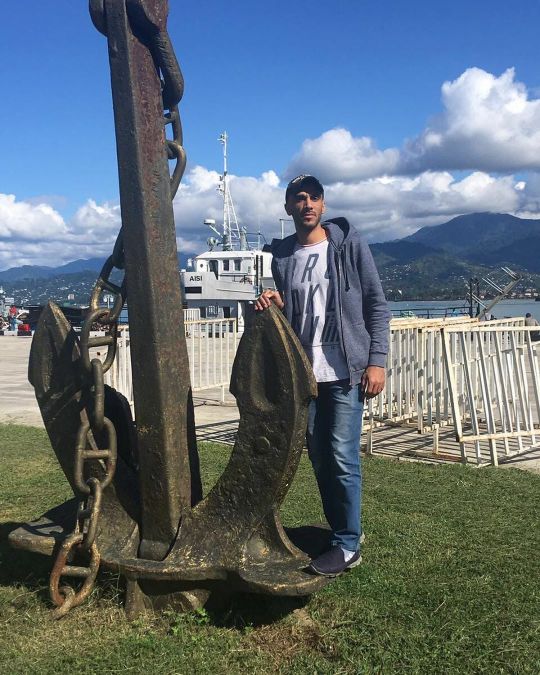
#georgia #atlanta #tbilisi #atl #florida #travel #batumi #love #texas #newyork #photography #usa #alabama #nature #ga #travelgram #music #miami #travelphotography #instagood #sakartvelo #mountains #gudauri #like #football #follow #explore #fashion #art #adventure @waleeds1112 (at Georgia (country)) https://www.instagram.com/p/B88JxgeJc2_/?igshid=1egfzm772rl2v
#georgia#atlanta#tbilisi#atl#florida#travel#batumi#love#texas#newyork#photography#usa#alabama#nature#ga#travelgram#music#miami#travelphotography#instagood#sakartvelo#mountains#gudauri#like#football#follow#explore#fashion#art#adventure
0 notes
Photo
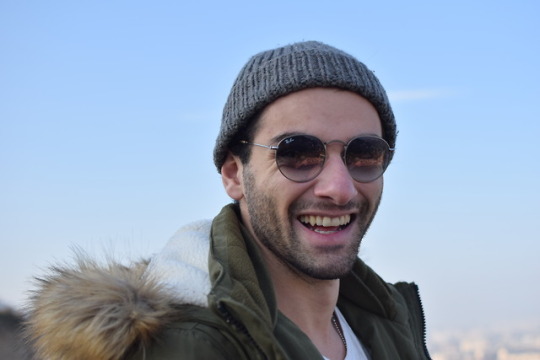
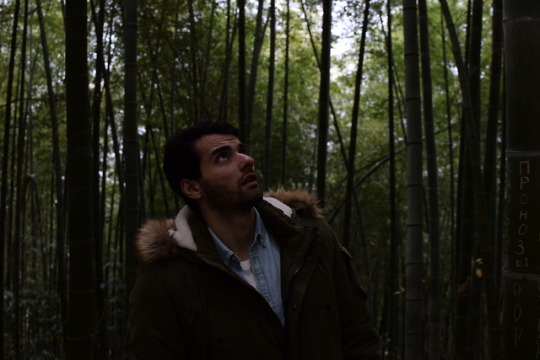
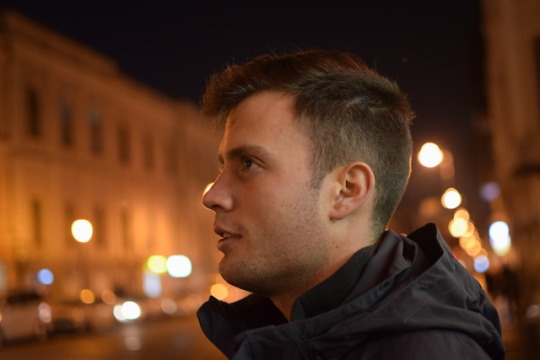
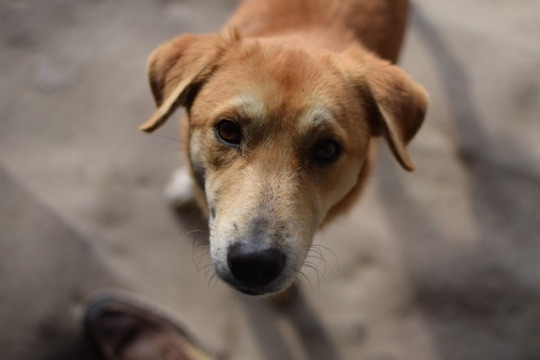
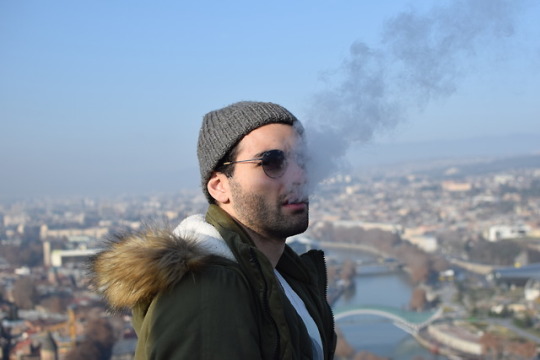
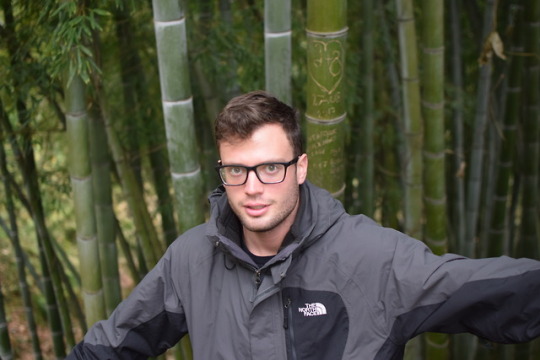
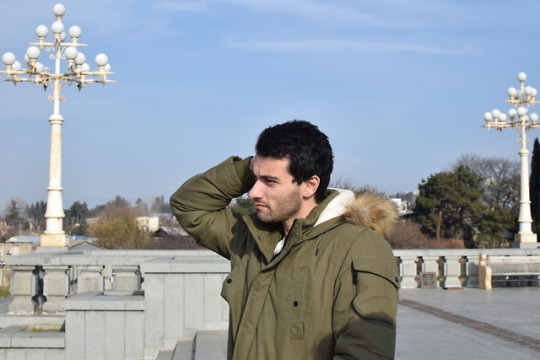
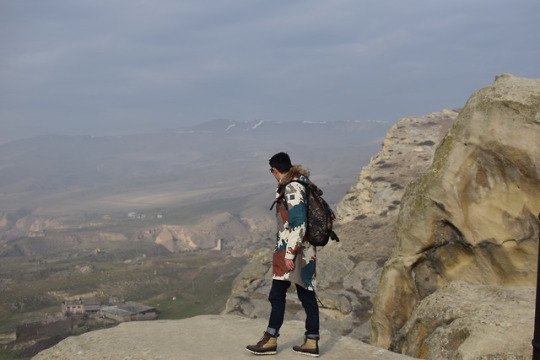
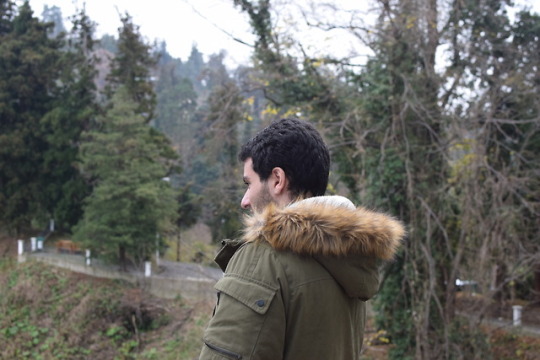
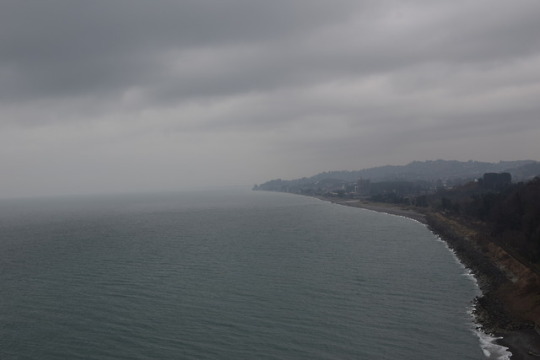
Sakartvelo means land of the Kartvelians. Great time exploring the lands of Iberia. Thanks to Sandro for showing Georgia to me. Malova for the memories.
0 notes
Text
Plánovanie: Po vlastnej osi do Sakartvelo
Náš najbližší cieľ je teraz pre zmenu smerom na východ. Do Sakartvelo, čo je len iný názov pre Gruzínsko. Spiatočné letenky za 60,- € sme kúpili pred rokom!
Zatiaľ veľa ľudí má neopodstatnené obavy v naplánovaní vlastnej dovolenky, či výletu za hranice nášho štátu a radšej využijú služby cestovných kancelárii. Ale stačí chvíľa na internete a môžeš si urobiť dovolenku podľa vlastných predstáv za podstatne nižšiu cenu. My ti teraz ukážeme, ako sme si naplánovali vlastnú týždennú dovolenku v Sakartvelo.
(more…)
View On WordPress
0 notes
Text
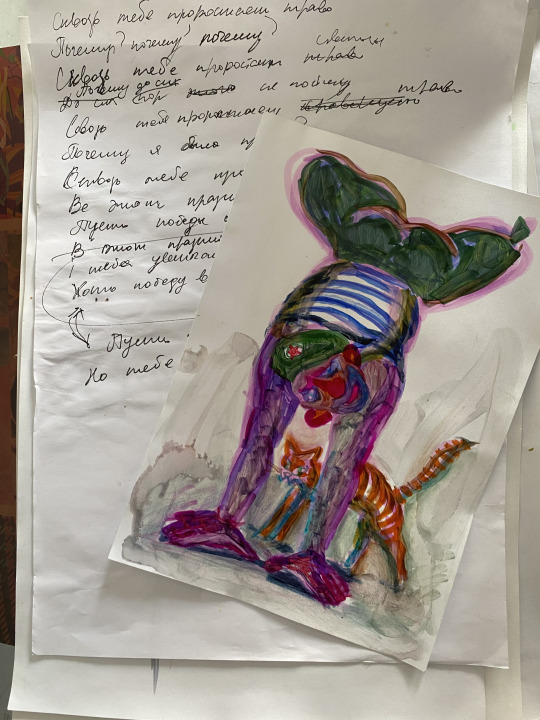
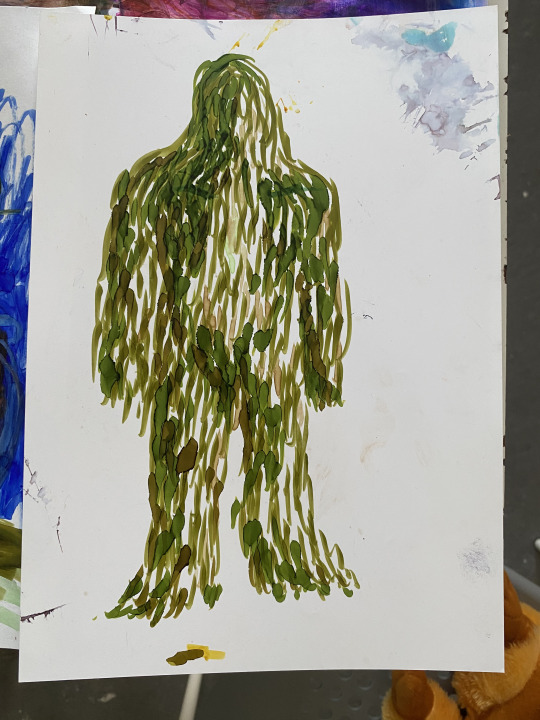
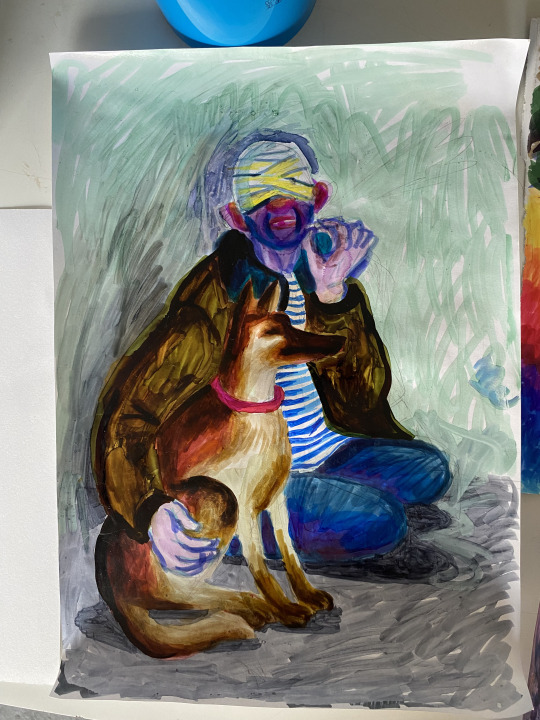
Аліна Якубенко - Пріключеніє русского солдата
Резиденція Вибачте Номерів Немає
10 липня, 2023 року,
Double room 1114, готель Інтурист-Закарпаття
У своїх малюнках та працях київська художниця Аліна Якубенко критично та іронічно розглядає агресивні та жорстокі дії “мирних” росіян зі зброєю в руках, в Україні. Котрі в Другій серії після російсько - чеченських та російсько-сакартвело воєн продовжили вбивати та гвалтувати в Україні під виглядом пригод випадково потрапившого русского солдата в Україну.
Резиденція та виставка Аліни Якубенко стали можливими завдяки підтримці:
European Cultural Foundation - Ukraine edition of the Culture of Solidarity Fund
The beaux-arts Academy in Paris
(eng)
Alina Yakubenko - The Adventure of a russian soldier
Residence Sorry No Rooms Available
July 10, 2023,
Double room 1114, Hotel Intourist-Zakarpattia
In the drawings and works, the Kyiv female artist Alina Yakubenko critically and ironically examines the aggressive and brutal actions of “peaceful” russians with weapons in their hands in Ukraine. Who in the Second Series, after the russian-Chechen and russian-Sakartvelo wars, continued to kill and rape in Ukraine under the guise of the adventures of a russian soldier who accidentally got into Ukraine.
Alina Yakubenko’s residency and exhibition became possible thanks to the support of:
European Cultural Foundation - Ukraine edition of the Culture of Solidarity Fund
The beaux-arts Academy in Paris
Photo credit Petro Ryaska
1 note
·
View note
Text

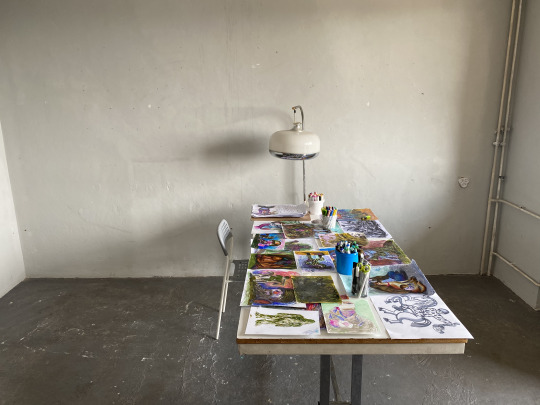
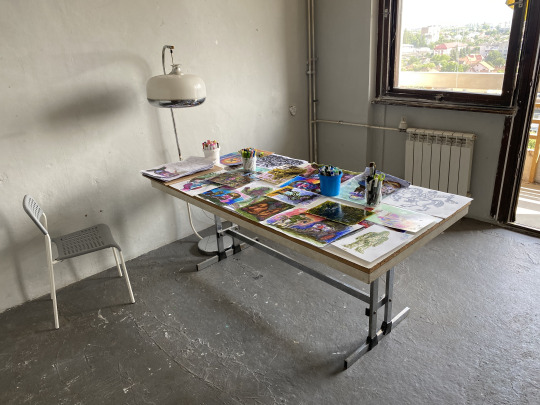
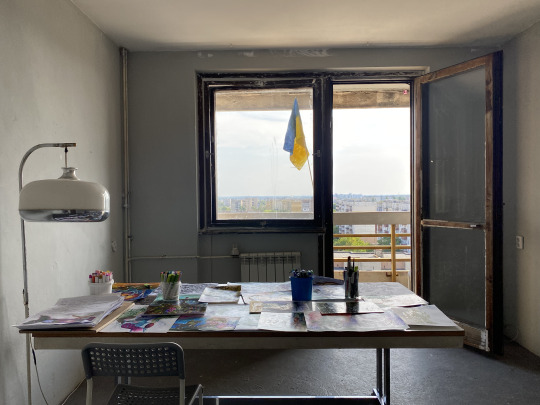
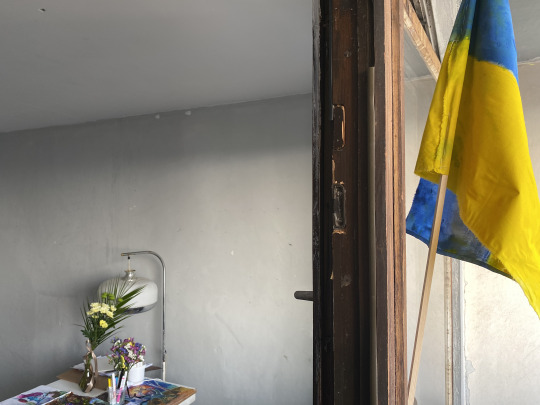
Аліна Якубенко - Пріключеніє русского солдата
Резиденція Вибачте Номерів Немає
10 липня, 2023 року,
Double room 1114, готель Інтурист-Закарпаття
У своїх малюнках та працях київська художниця Аліна Якубенко критично та іронічно розглядає агресивні та жорстокі дії “мирних” росіян зі зброєю в руках, в Україні. Котрі в Другій серії після російсько - чеченських та російсько-сакартвело воєн продовжили вбивати та гвалтувати в Україні під виглядом пригод випадково потрапившого русского солдата в Україну.
Резиденція та виставка Аліни Якубенко стали можливими завдяки підтримці:
European Cultural Foundation - Ukraine edition of the Culture of Solidarity Fund
The beaux-arts Academy in Paris
(eng)
Alina Yakubenko - The Adventure of a russian soldier
Residence Sorry No Rooms Available
July 10, 2023,
Double room 1114, Hotel Intourist-Zakarpattia
In the drawings and works, the Kyiv female artist Alina Yakubenko critically and ironically examines the aggressive and brutal actions of “peaceful” russians with weapons in their hands in Ukraine. Who in the Second Series, after the russian-Chechen and russian-Sakartvelo wars, continued to kill and rape in Ukraine under the guise of the adventures of a russian soldier who accidentally got into Ukraine.
Alina Yakubenko’s residency and exhibition became possible thanks to the support of:
European Cultural Foundation - Ukraine edition of the Culture of Solidarity Fund
The beaux-arts Academy in Paris
Photo credit Petro Ryaska
0 notes
Text
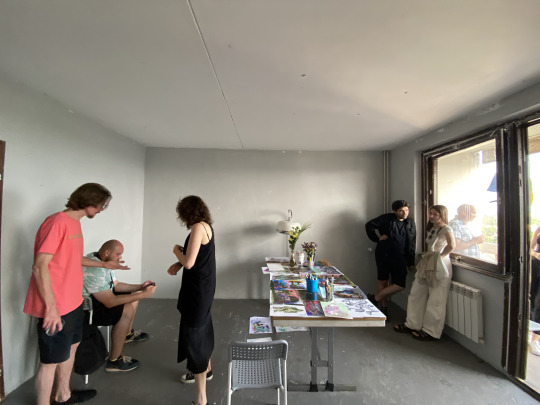
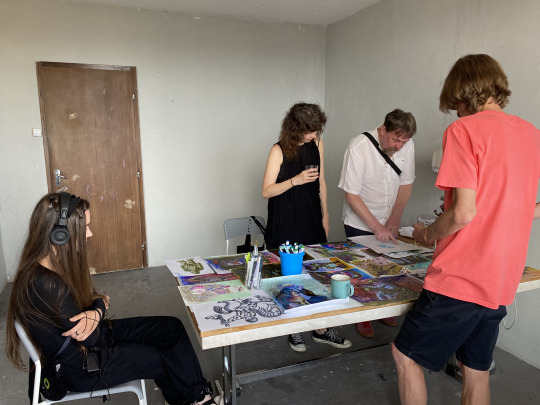
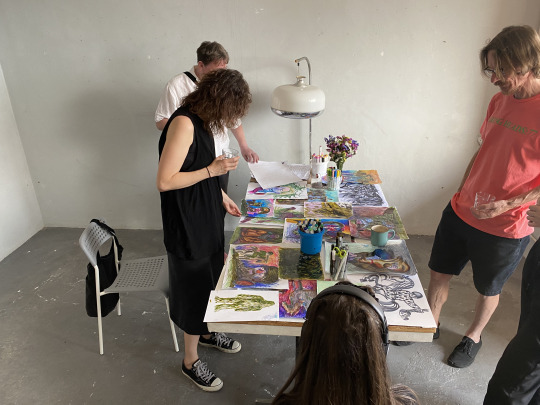
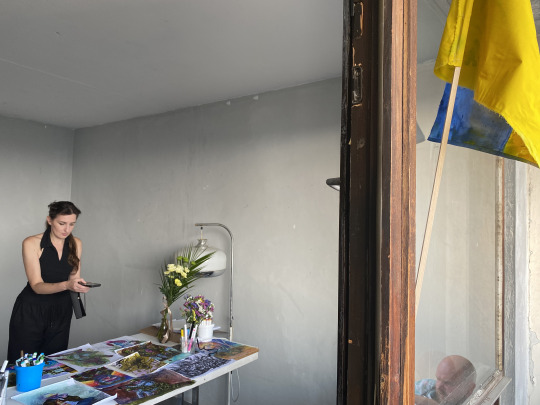
Аліна Якубенко - Пріключеніє русского солдата
Резиденція Вибачте Номерів Немає
10 липня, 2023 року,
Double room 1114, готель Інтурист-Закарпаття
У своїх малюнках та працях київська художниця Аліна Якубенко критично та іронічно розглядає агресивні та жорстокі дії “мирних” росіян зі зброєю в руках, в Україні. Котрі в Другій серії після російсько - чеченських та російсько-сакартвело воєн продовжили вбивати та гвалтувати в Україні під виглядом пригод випадково потрапившого русского солдата в Україну.
Резиденція та виставка Аліни Якубенко стали можливими завдяки підтримці:
European Cultural Foundation - Ukraine edition of the Culture of Solidarity Fund
The beaux-arts Academy in Paris
(eng)
Alina Yakubenko - The Adventure of a russian soldier
Residence Sorry No Rooms Available
July 10, 2023,
Double room 1114, Hotel Intourist-Zakarpattia
In the drawings and works, the Kyiv female artist Alina Yakubenko critically and ironically examines the aggressive and brutal actions of “peaceful” russians with weapons in their hands in Ukraine. Who in the Second Series, after the russian-Chechen and russian-Sakartvelo wars, continued to kill and rape in Ukraine under the guise of the adventures of a russian soldier who accidentally got into Ukraine.
Alina Yakubenko’s residency and exhibition became possible thanks to the support of:
European Cultural Foundation - Ukraine edition of the Culture of Solidarity Fund
The beaux-arts Academy in Paris
Photo credit Petro Ryaska
0 notes
Text
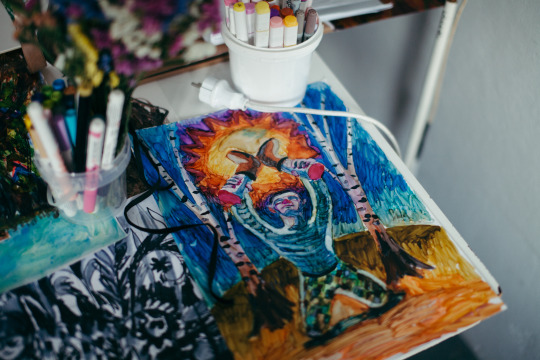
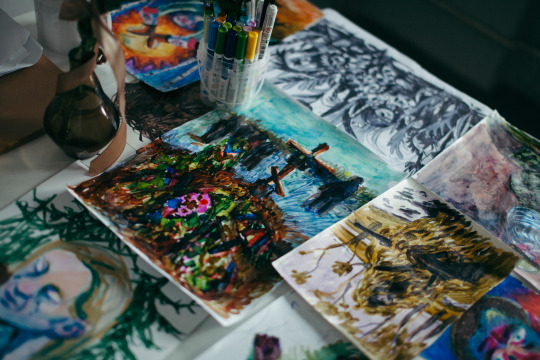
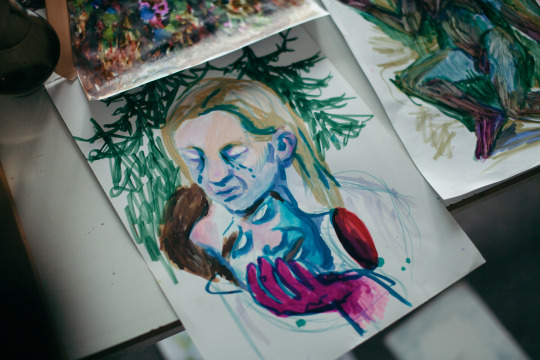
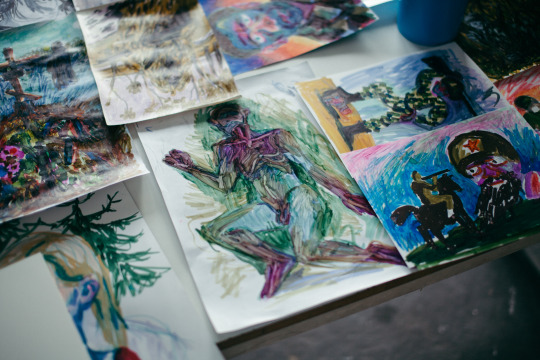
Аліна Якубенко - Пріключеніє русского солдата
Резиденція Вибачте Номерів Немає
10 липня, 2023 року,
Double room 1114, готель Інтурист-Закарпаття
У своїх малюнках та працях київська художниця Аліна Якубенко критично та іронічно розглядає агресивні та жорстокі дії “мирних” росіян зі зброєю в руках, в Україні. Котрі в Другій серії після російсько - чеченських та російсько-сакартвело воєн продовжили вбивати та гвалтувати в Україні під виглядом пригод випадково потрапившого русского солдата в Україну.
Резиденція та виставка Аліни Якубенко стали можливими завдяки підтримці:
European Cultural Foundation - Ukraine edition of the Culture of Solidarity Fund
The beaux-arts Academy in Paris
(eng)
Alina Yakubenko - The Adventure of a russian soldier
Residence Sorry No Rooms Available
July 10, 2023,
Double room 1114, Hotel Intourist-Zakarpattia
In the drawings and works, the Kyiv female artist Alina Yakubenko critically and ironically examines the aggressive and brutal actions of “peaceful” russians with weapons in their hands in Ukraine. Who in the Second Series, after the russian-Chechen and russian-Sakartvelo wars, continued to kill and rape in Ukraine under the guise of the adventures of a russian soldier who accidentally got into Ukraine.
Alina Yakubenko’s residency and exhibition became possible thanks to the support of:
European Cultural Foundation - Ukraine edition of the Culture of Solidarity Fund
The beaux-arts Academy in Paris
Photo credit Mykhaylo Melnychenko
0 notes
Text
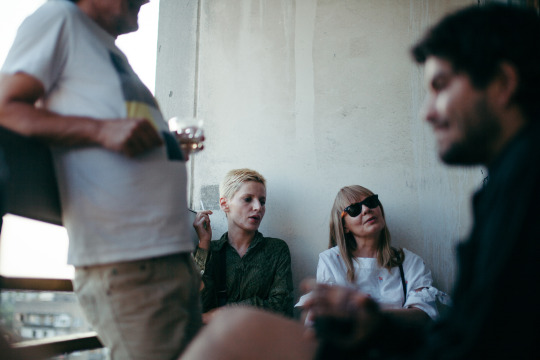
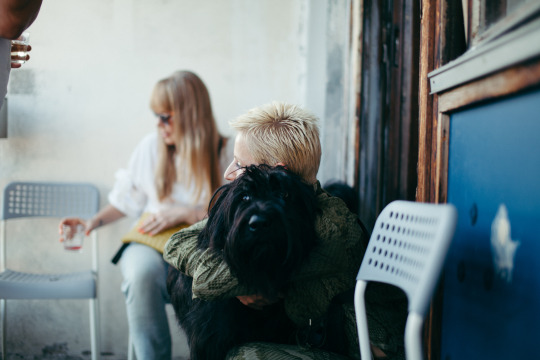
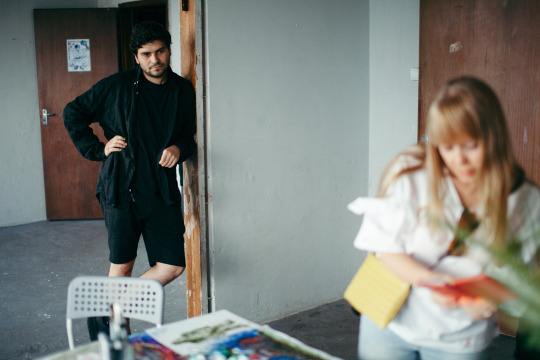
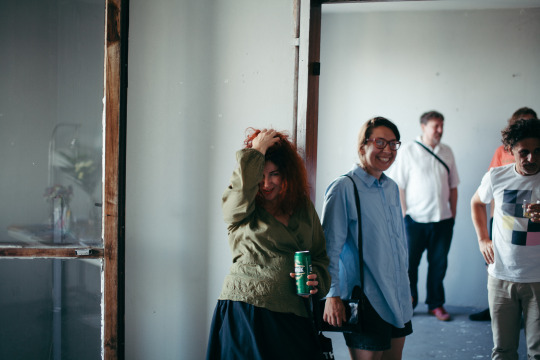
Аліна Якубенко - Пріключеніє русского солдата
Резиденція Вибачте Номерів Немає
10 липня, 2023 року,
Double room 1114, готель Інтурист-Закарпаття
У своїх малюнках та працях київська художниця Аліна Якубенко критично та іронічно розглядає агресивні та жорстокі дії “мирних” росіян зі зброєю в руках, в Україні. Котрі в Другій серії після російсько - чеченських та російсько-сакартвело воєн продовжили вбивати та гвалтувати в Україні під виглядом пригод випадково потрапившого русского солдата в Україну.
Резиденція та виставка Аліни Якубенко стали можливими завдяки підтримці:
European Cultural Foundation - Ukraine edition of the Culture of Solidarity Fund
The beaux-arts Academy in Paris
(eng)
Alina Yakubenko - The Adventure of a russian soldier
Residence Sorry No Rooms Available
July 10, 2023,
Double room 1114, Hotel Intourist-Zakarpattia
In the drawings and works, the Kyiv female artist Alina Yakubenko critically and ironically examines the aggressive and brutal actions of “peaceful” russians with weapons in their hands in Ukraine. Who in the Second Series, after the russian-Chechen and russian-Sakartvelo wars, continued to kill and rape in Ukraine under the guise of the adventures of a russian soldier who accidentally got into Ukraine.
Alina Yakubenko’s residency and exhibition became possible thanks to the support of:
European Cultural Foundation - Ukraine edition of the Culture of Solidarity Fund
The beaux-arts Academy in Paris
Photo credit Mykhaylo Melnychenko
0 notes
Text
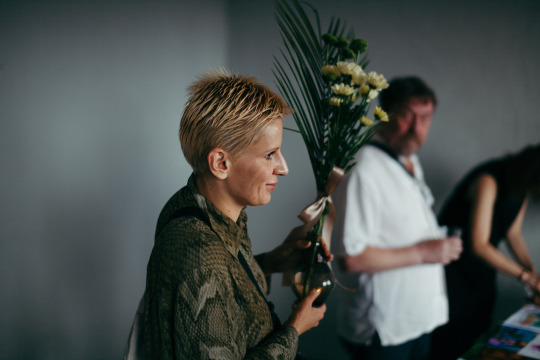
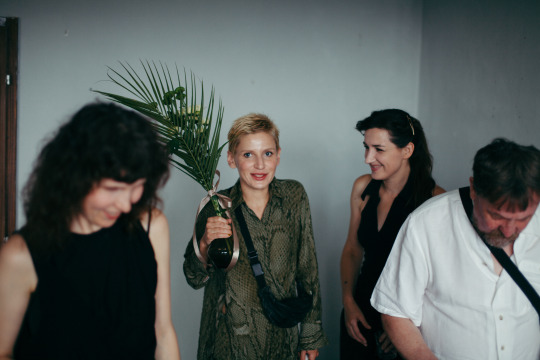
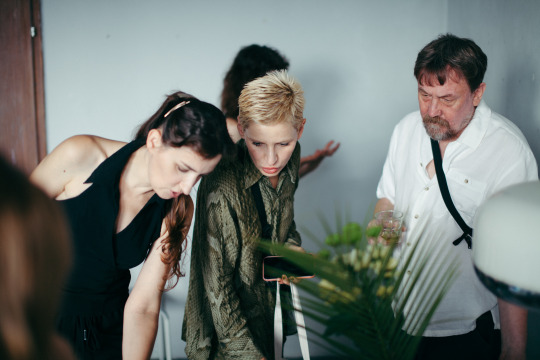
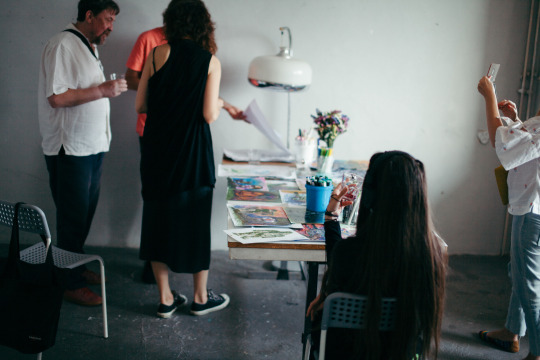
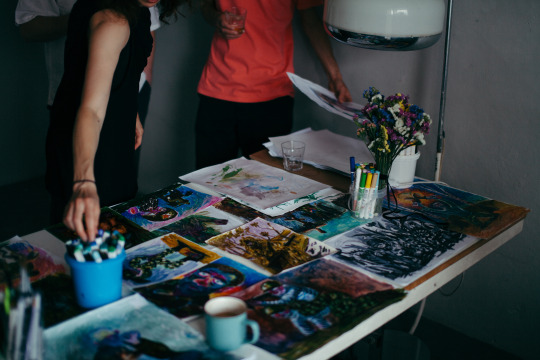
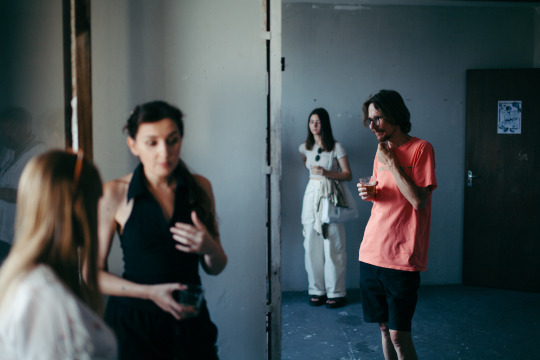
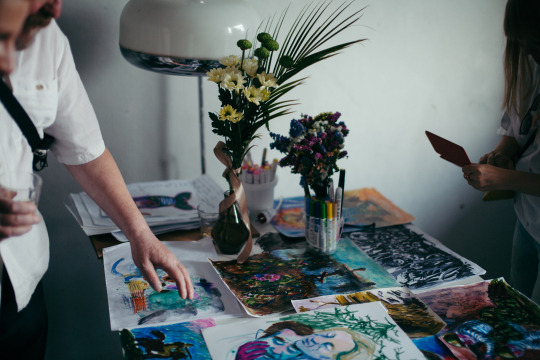
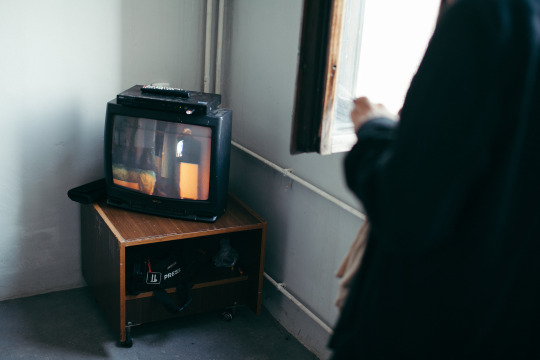
Аліна Якубенко - Пріключеніє русского солдата
Резиденція Вибачте Номерів Немає
10 липня, 2023 року,
Double room 1114, готель Інтурист-Закарпаття
У своїх малюнках та працях київська художниця Аліна Якубенко критично та іронічно розглядає агресивні та жорстокі дії “мирних” росіян зі зброєю в руках, в Україні. Котрі в Другій серії після російсько - чеченських та російсько-сакартвело воєн продовжили вбивати та гвалтувати в Україні під виглядом пригод випадково потрапившого русского солдата в Україну.
Резиденція та виставка Аліни Якубенко стали можливими завдяки підтримці:
European Cultural Foundation - Ukraine edition of the Culture of Solidarity Fund
The beaux-arts Academy in Paris
(eng)
Alina Yakubenko - The Adventure of a russian soldier
Residence Sorry No Rooms Available
July 10, 2023,
Double room 1114, Hotel Intourist-Zakarpattia
In the drawings and works, the Kyiv female artist Alina Yakubenko critically and ironically examines the aggressive and brutal actions of “peaceful” russians with weapons in their hands in Ukraine. Who in the Second Series, after the russian-Chechen and russian-Sakartvelo wars, continued to kill and rape in Ukraine under the guise of the adventures of a russian soldier who accidentally got into Ukraine.
Alina Yakubenko’s residency and exhibition became possible thanks to the support of:
European Cultural Foundation - Ukraine edition of the Culture of Solidarity Fund
The beaux-arts Academy in Paris
Photo credit Mykhaylo Melnychenko
0 notes
Text
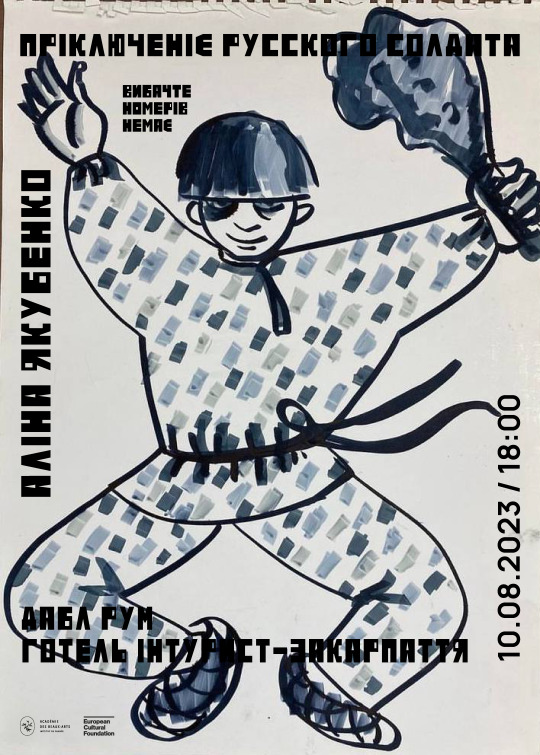
Аліна Якубенко - Пріключеніє русского солдата
Резиденція Вибачте Номерів Немає
10 липня, 18.00, 2023 року,
Double room 1114, готель Інтурист-Закарпаття
У своїх малюнках та працях київська художниця Аліна Якубенко критично та іронічно розглядає агресивні та жорстокі дії “мирних” росіян зі зброєю в руках, в Україні. Котрі в Другій серії після російсько - чеченських та російсько-сакартвело воєн продовжили вбивати та гвалтувати в Україні під виглядом пригод випадково потрапившого русского солдата в Україну.
Резиденція та виставка Аліни Якубенко стали можливими завдяки підтримці:
European Cultural Foundation - Ukraine edition of the Culture of Solidarity Fund
The beaux-arts Academy in Paris
(eng)
Alina Yakubenko - The Adventure of a russian soldier
Residence Sorry No Rooms Available
July 10, 18.00, 2023,
Double room 1114, Hotel Intourist-Zakarpattia
In the drawings and works, the Kyiv female artist Alina Yakubenko critically and ironically examines the aggressive and brutal actions of "peaceful" russians with weapons in their hands in Ukraine. Who in the Second Series, after the russian-Chechen and russian-Sakartvelo wars, continued to kill and rape in Ukraine under the guise of the adventures of a russian soldier who accidentally got into Ukraine.
Alina Yakubenko's residency and exhibition became possible thanks to the support of:
European Cultural Foundation - Ukraine edition of the Culture of Solidarity Fund
The beaux-arts Academy in Paris
Poster credit: Attila Hazhlinski
Image credit in the Poster Alina Yakubenko - drawing from the series "The Adventure of a russian soldier"
0 notes
Text
(Click the images for full-sized versions!)
Water sprayers were about on the streets of Vake as we left, damping down the dust and making the air deliciously cool. We rode the Metro to Didube station, across the river from something marked DIGHOMI MASSIVE on our maps, and decamped into a chaos of numberless minibuses. Getting the right marshrutka was as simple as making eye contact with one of the blokes at the metro station. “Marshrutka? Batumi?” “Akhaltsikhe please.” “Akhaltsikhe! Follow. Here.” “How much?” (Ten fingers.) “When will this go?” “When ready.” With the bus mostly empty, we figured we weren’t in a great rush, and it was equally easy to find some cheap pastries in among the market-stalls there (through the time-honoured tradition of pointing at random appetising-looking ones).
The drive was almost half the width of the country – two hundred whole kilometres! – and followed the banks of the great butternut-coloured Kura River up through yellow plains and green dales into the dry ochre highlands of the south-west. The combination of creaky marshrutka, mountain switchbacks and roads that hadn’t seen a great deal of love since Brezhnev made the ride slightly hair-raising (though not as bad as Kalamata to Mystras), and only halfway through did I notice one of our fellow travellers had a bird in a very small box on her lap. We arrived early in the afternoon, by an anonymous obelisk to the dead of 1941-45, and made our way to our guesthouse. Akhaltsikhe is a charismatic town of no great size, nestled in a confluence of valleys; its name, one of those gorgeous, quintessentially Georgian-sounding words, means “New castle.”
Also, for some bizarre reason, its river has very mixed reviews on Google Maps.
We had found rooms at the “Happy Holiday” guesthouse (linked ‘cos it’s very highly recommended). The fittings were charming; the host couple spoke little English but their 12-year-old daughter was a splendid translator, and the stickers on the door forbade us from smoking cigarettes, e-cigarettes, and hookah. We showered so we wouldn’t be Akhaltsticky, had a splendid lunch round the corner, and then headed up to the new castle.
The huge Rabati castle is a monument to a local military history so long, bloody and tangled I don’t have the time or confidence to attempt to reproduce it; the present form changed hands repeatedly between the local Georgians, Tamerlane’s Timurids and the warring Islamic gunpowder-empires that succeded them, notably the Persian Safavids and the Ottoman Turks. A recent, clearly very expensive, reconstruction has decided to return it to a specifically Ottoman splendour of carved wooden shutters, shady colonnades and tinkling fountains, all under prominent Georgian flags.
The reconstruction – I specifically use that rather than restoration – is at once gorgeously accomplished and weirdly soulless. There’s no furniture and little information, and none of the buildings give any real clues as to their purpose; the rebuilt madrasa, its stonecarving perfect, was just a line of empty cells. There’s not much of a museum-y aspect to it; this is history as monument-to-marvel-at (and very marvellous it is, too), with no attempt to present it as having ever housed something alive. (The available information was also oddly eager to point out that it was in no way a working mosque.)
By pure chance, we’d arrived on June 30, the day of the martyrdom of Saint Shalva of Akhaltsikhe,* now commemorated every year by a big town music festival – Georgian-flag bunting was going up, drinks being unpacked, sound systems unlimbered. We wandered back down the hill at dusk, and chilled on the terrace outside the guesthouse where the landlord, in reasonable German, offered us some of his homemade wine and, through his daughter, helped us plan the next leg to Batumi. It emerged that something that looked entirely logical on the map – the direct road through the mountains from Akhaltsikhe to Batumi, which was most of the reason we’d even ended up there – was too poor quality for anyone to want to drive us there. Given the quality of road Georgians happily would deal with, we were both slightly frightened of what that might look like. So getting to the Black Sea would mean looping all the way back to Kutaisi, at considerably greater time and expense than expected. Ho hum.
Arpi had a stomach complaint and retired to bed early, but the daughter of the house and a group of her school friends showed up, ready to go up to the castle for the festival. They all practiced their English on me – it’s very striking how the older generation speak Russian as a second language and the younger ones English – and I showed them some British coins, explaining the queen, the lion, the portcullis, the flowers. Our hosts saw nothing untoward about letting a group of preteen girls wander off with a large foreigner, so they took me up into the towers of Rabati (unlit, poorly paved, wobbly ladders, general Ukrainian-tier health and safety but with scorpions – all genuinely great fun) and we watched the open-air concert** unfold in Georgian, Russian and accented English, the crowds of happy Georgian teenagers in the thousand-year-old fortress feeling at once incongruous and perfectly appropriate.
* Shalva Toreli-Akhaltiskheli was a 13th century general serving in the armies of Tamar, who trashed various Turkic and Azeri armies and was executed by the last Shah of the Khwarezmian Empire for refusing to convert to Islam. This was plenty to get you sainted at the time – things were different back then. Or perhaps not.
** Finishing this post up in the dawn of 2020, I wondered if there was a video of the festival from 2018 anywhere online. There isn’t, but there is one of the 2017 episode, which featured – utterly charmingly – guests from Newcastle-upon-Tyne.
Georgia 2018
Good morning, Kutaisi! – Museums and wine – Chiatura from above – Pioneers’ Palace, Gori – Tbilisi – David Gareja – Akhaltsikhe – Vardzia
Newcastle-upon-Potskhovistskali (Click the images for full-sized versions!) Water sprayers were about on the streets of Vake as we left, damping down the dust and making the air deliciously cool.
0 notes
Text
Night Flight to Kutaisi
Night Flight to Kutaisi
Ferihegy airport was a surreal place at five minutes to midnight, gate B12 haunted by those for whom the low price justified a midnight flight arriving at 5am: a matronly posse in floral dresses who could be from anywhere in the eastern bloc, a few young backpackers, three metalheads in black hoodies solid with embroidered band patches, a tough sounding British female contingent looking like a…
View On WordPress
0 notes